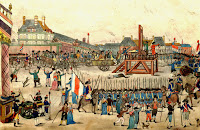"If one were to compare the thought of Sartre and St. Thomas
and reduce both to syllogistic form, one would realize that both start with the
same 'major premise,' namely from this principle: things have an essential nature only in so
far as they are fashioned by thought.
Since man exists and has a constructive intellect, which can invent and
has in fact invented, for instance, a letter opener, therefore, and for no
other reason, we can speak of the 'nature' of a letter opener. Then, Sartre continues, because there exists no
creative intelligence which could have designed man and all natural
things—and could have put an inner significance into them—therefore there is no 'nature' in things that are not manufactured and artificial. . . . St.
Thomas, on the contrary, declares:
Because and in so far as God has creatively thought things, just so and
to that extent have they a nature."
Josef Pieper, Silence
of St. Thomas, 53-53, as quoted by Michele M. Schumacher, "Gender ideology
and the 'artistic' fabrication of human sex:
nature as norm or the remaking of the human?," The Thomist: a speculative
quarterly review 80, no. 3 (July 2016):
403-404 (363-423), underscoring mine.
 "law . . . is the ally of everyone. . . . [W]e don't allow [our children] to be free until we establish a constitution in them, just as in a city, and—by fostering their best part [(the rational part)] with our own—equip them with a guardian and ruler similar to our own to take our place. Then, and only then, we set them free."
"law . . . is the ally of everyone. . . . [W]e don't allow [our children] to be free until we establish a constitution in them, just as in a city, and—by fostering their best part [(the rational part)] with our own—equip them with a guardian and ruler similar to our own to take our place. Then, and only then, we set them free."


























